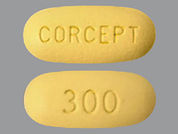Korlym
Korlym generic name: Mifepristone
What is Korlym used for?
This medication is used to control high blood sugar in people who have a certain condition (Cushing's syndrome), and who have failed surgery or cannot have surgery to correct the condition. Cushing's syndrome is caused by the body producing too much of a certain hormone (cortisol) which can cause glucose intolerance or type 2 diabetes. Mifepristone works by blocking the effects of cortisol.
CHEMICAL NAME
DRUG TYPE
Endocrine DisordersKorlym Prices
Searching for the lowest prices
Korlym Frequently Asked Questions
If you miss a dose, take it as soon as you remember. If it is near the time of the next dose, skip the missed dose. Take your next dose at the regular time. Do not double the dose to catch up.
IMPORTANT: HOW TO USE THIS INFORMATION: This is a summary and does NOT have all possible information about this product. This information does not assure that this product is safe, effective, or appropriate for you. This information is not individual medical advice and does not substitute for the advice of your health care professional. Always ask your health care professional for complete information about this product and your specific health needs.
